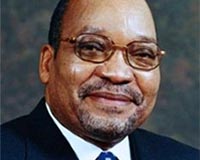| . |  |
. |
Nairobi, Kenya (UPI) Aug 23, 2010 Since 2007 under U.N. auspices the African Union Mission in Somalia has been deployed in a regional peacekeeping mission. AMISOM's mission is to support transitional governmental structures, implement a national security plan, train Somali governmental security forces and help provide a secure environment for delivering humanitarian aid. A major disruptive element in pacification efforts has been the rise of the militant Islamic group al-Shabaab, reportedly linked to al-Qaida, but AMISOM spokesman Maj. Ba-Hoku Barigye told reporters that the deployment of AMISOM troops in strategic places has reduced al-Shabaab's ability to deploy improvised explosive devices against AMISOM peacekeepers, the East African reported Monday. The issue of deployment of AU peacekeeping troops in Africa's largest nation is one of adroit dispersal of limited resources, as there are currently 6,300 AMISON peacekeepers from Uganda and Burundi on the ground. Barigye is pressing for AMISON to supplement current troops deployments up to the levels that AU had proposed three years ago of 8,000 troops in nine infantry battalions, noting that in the current unstable situation, even the original complement of 8,000 may not be sufficient for current needs as al-Shabaab's attract more battle-hardened and better equipped foreign fighters. Barigye told reporters: "But we have to dissipate the perception that AMISON is looking for more soldiers to fight al-Shabaab. Our mandate is to maintain peace and create an environment for national discussion and political settlement. We cannot directly confront al-Shabaab but we have the right to self defense when we are attacked." The African Union is considering expanding AMISON's role in pacifying Somalia. During a meeting last month in Kampala, Uganda, AU ministers agreed to expand the AMISON mandate from a peacekeeping focus operating solely in self-defense mode to a peace-enforcement agenda that could more directly engage al-Shabaab forces. The AU decision followed the July 11 twin bombing attacks in Kampala targeting a restaurant and a club where people had gathered to watch the World Cup soccer final. A total of 76 people were killed and dozens were injured. Al-Shabaab claimed responsibility for the attacks. Ugandan security forces subsequently arrested four men, who admitted their complicity in the attacks. The quartet's leader after admitting that he was a member of al-Shabaab said that he wanted to kill Americans because of his religious conviction. The Ugandan and Burundi AMISOM may soon be receiving reinforcements, as on July 23 both Djibouti and Guinea pledged troops to assist AMISOM's mission.
earlier related report The project, in conjunction with the UN refugee agency UNHCR, started with the applicants being given Sierra Leonean passports at Blamassee Camp, Virginia, around 25 kilometres (15 miles) from the capital Monrovia. "That is part of the process of moving towards a solution to obtaining the Liberian passports," said Wallace Quaye, field officer for the Liberia Refugees Repatriation and Reunification Commission (LRRRC) Around 120,000 Sierra Leonean refugees fled to Liberia as a brutal civil war raged in their own country between 1991 and 2002. Many returned when war broke out in Liberia in 2003, and another 4,118 have been assisted by the UNHCR to return to Sierra Leone. "By the end of 2003, some 13,900 refugees were verified in the UNHCR data base, and resided in camps. "In October 2006, 2,155 refugees participated in the local integration program, of which 69 percent opted for naturalization and 31 percent opted for resident alien status," said Momolu Freeman, reintegration officer for the LRRRC. He said the most difficult aspect of the local integration process was finding land for the former refugees, and 352 hectares around the country have been procured for them.
Share This Article With Planet Earth
Related Links Africa News - Resources, Health, Food
 South Africa's Zuma visits key partner China to boost ties
South Africa's Zuma visits key partner China to boost tiesJohannesburg (AFP) Aug 22, 2010 South Africa's President Jacob Zuma on Tuesday makes an official visit to China to broaden ties with the emerging superpower which is fast becoming a top investor in Africa. The visit is seen as an opportunity to harness shared interests, with no begging bowl in hand. Trade between China and Africa's biggest economy has been growing since 1998, and Beijing last year overtook the United S ... read more |
|
| The content herein, unless otherwise known to be public domain, are Copyright 1995-2010 - SpaceDaily. AFP and UPI Wire Stories are copyright Agence France-Presse and United Press International. ESA Portal Reports are copyright European Space Agency. All NASA sourced material is public domain. Additional copyrights may apply in whole or part to other bona fide parties. Advertising does not imply endorsement,agreement or approval of any opinions, statements or information provided by SpaceDaily on any Web page published or hosted by SpaceDaily. Privacy Statement |